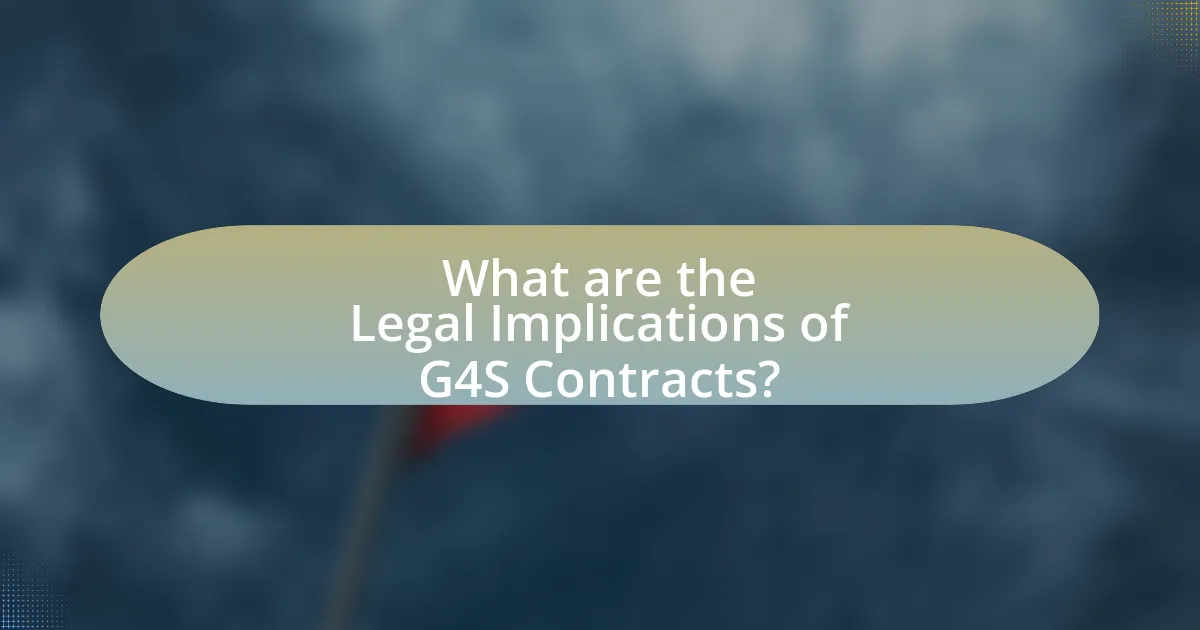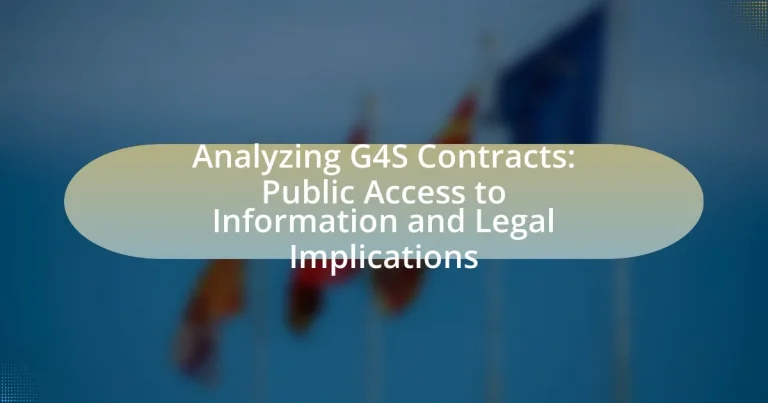G4S, a global security company, engages in contracts that outline the provision of security services, including manned guarding and risk management, establishing clear terms and responsibilities for both the company and its clients. The article examines the significance of these contracts, particularly within the public sector, highlighting their role in ensuring accountability, compliance with legal standards, and the importance of public access to contract information for transparency. It also addresses the legal implications of G4S contracts, including compliance with procurement laws and potential disputes arising from non-compliance. Furthermore, the article discusses challenges in analyzing these contracts and best practices for effective evaluation, emphasizing the need for stakeholder engagement and the use of analytical tools.

What are G4S Contracts and Their Importance?
G4S contracts are agreements between G4S, a global security company, and various clients for the provision of security services, including manned guarding, electronic monitoring, and risk management. These contracts are important because they establish the terms of service, responsibilities, and expectations for both G4S and its clients, ensuring accountability and compliance with legal and regulatory standards. The significance of these contracts is underscored by their role in maintaining public safety and security, as well as their impact on the legal implications surrounding the provision of security services, which can include liability issues and adherence to local laws.
How do G4S contracts function within the public sector?
G4S contracts within the public sector function as agreements where G4S provides security services to government entities, often through competitive bidding processes. These contracts typically outline the scope of services, performance standards, and compliance with legal and regulatory requirements. For instance, G4S has secured contracts with various public institutions, including law enforcement agencies and correctional facilities, which necessitate adherence to strict operational protocols and transparency measures. The effectiveness of these contracts is often evaluated based on service delivery metrics and compliance with public accountability standards, ensuring that taxpayer funds are utilized efficiently.
What types of services do G4S contracts typically cover?
G4S contracts typically cover a range of security services, including manned guarding, electronic security systems, cash solutions, and risk management. These services are designed to protect assets, ensure safety, and manage security risks for various clients, including government entities and private organizations. The breadth of services is supported by G4S’s extensive experience in the security sector, which includes operating in over 90 countries and employing hundreds of thousands of security personnel globally.
How are G4S contracts awarded and managed?
G4S contracts are awarded through a competitive bidding process, where potential suppliers submit proposals based on specific requirements outlined by the contracting authority. The management of these contracts involves ongoing performance monitoring, compliance checks, and regular communication between G4S and the client to ensure service delivery meets agreed standards. This process is governed by legal frameworks that mandate transparency and accountability, ensuring that contracts are executed in accordance with public procurement regulations.
Why is public access to G4S contracts significant?
Public access to G4S contracts is significant because it promotes transparency and accountability in the management of public resources. By allowing the public to scrutinize these contracts, stakeholders can assess the terms, costs, and performance metrics associated with G4S’s services, which include security and facility management for government entities. This transparency helps to prevent corruption and ensures that public funds are used effectively, as evidenced by various studies indicating that increased access to contract information correlates with reduced instances of fraud and mismanagement in public procurement processes.
What are the implications of transparency in G4S contracts?
Transparency in G4S contracts enhances accountability and public trust while reducing the risk of corruption. By making contract details accessible, stakeholders can scrutinize terms, pricing, and performance metrics, which fosters a competitive environment and encourages ethical practices. For instance, the UK government has emphasized the importance of transparency in public procurement, leading to increased scrutiny of G4S’s operations, especially following controversies related to service delivery and human rights issues. This scrutiny can result in improved service quality and compliance with legal standards, as evidenced by the heightened regulatory oversight in sectors where G4S operates.
How does public access affect accountability in contract execution?
Public access enhances accountability in contract execution by allowing stakeholders to monitor compliance and performance. When contract details are publicly available, it enables citizens, oversight bodies, and media to scrutinize the actions of contracting parties, thereby reducing opportunities for misconduct. For instance, transparency in government contracts has been shown to correlate with lower instances of fraud and mismanagement, as evidenced by studies from organizations like Transparency International, which highlight that open data initiatives lead to improved governance outcomes. This increased scrutiny fosters a culture of accountability, compelling contractors to adhere to agreed terms and conditions.

What are the Legal Implications of G4S Contracts?
The legal implications of G4S contracts primarily involve compliance with regulatory standards, liability issues, and contractual obligations. G4S, as a global security company, must adhere to laws governing private security services, which include licensing requirements and adherence to labor laws. Additionally, G4S contracts often include clauses that outline liability for breaches of contract, which can lead to legal disputes if either party fails to meet their obligations. For instance, in the UK, G4S has faced scrutiny over its contracts with government entities, leading to legal challenges regarding performance and accountability. These legal frameworks ensure that G4S operates within the law while protecting the rights of clients and employees.
What legal frameworks govern G4S contracts?
G4S contracts are governed by various legal frameworks, including public procurement laws, contract law, and specific regulations pertaining to security services. Public procurement laws ensure that contracts awarded by government entities comply with transparency and competitive bidding requirements, while contract law governs the terms and enforceability of agreements made between G4S and its clients. Additionally, regulations specific to the security industry, such as licensing requirements and standards for private security firms, further shape the legal landscape in which G4S operates. These frameworks collectively ensure compliance, accountability, and the protection of public interests in the execution of security services.
How do procurement laws impact G4S contract management?
Procurement laws significantly impact G4S contract management by establishing regulatory frameworks that govern how contracts are awarded, executed, and monitored. These laws require G4S to adhere to principles of transparency, competition, and accountability, which can influence the bidding process and contract terms. For instance, public procurement regulations often mandate that contracts be awarded through competitive bidding, ensuring that G4S must demonstrate value for money and compliance with legal standards. Additionally, procurement laws may impose specific reporting and auditing requirements, compelling G4S to maintain detailed records and provide access to information, thereby enhancing oversight and public trust in their operations.
What are the consequences of non-compliance with contract terms?
Non-compliance with contract terms can lead to legal consequences, including breach of contract claims, financial penalties, and potential damages awarded to the aggrieved party. When a party fails to adhere to the agreed-upon terms, the other party may seek remedies such as specific performance, which compels the non-compliant party to fulfill their obligations, or monetary compensation for losses incurred due to the breach. According to the American Bar Association, breaches can result in significant financial repercussions, as parties may be liable for consequential damages that arise directly from the non-compliance. Additionally, non-compliance can damage reputations and lead to loss of future business opportunities, as trust is eroded between the parties involved.
How do legal disputes arise in G4S contracts?
Legal disputes in G4S contracts typically arise from breaches of contract, disagreements over contract interpretation, and compliance issues. These disputes can occur when either party fails to meet the obligations outlined in the contract, leading to claims for damages or specific performance. For instance, if G4S does not deliver services as stipulated, clients may seek legal recourse. Additionally, ambiguities in contract language can lead to differing interpretations, prompting disputes that require legal resolution. Compliance issues, such as failure to adhere to regulatory standards, can also trigger legal challenges, as stakeholders may pursue litigation to address perceived violations.
What common issues lead to legal challenges in G4S contracts?
Common issues that lead to legal challenges in G4S contracts include non-compliance with contractual obligations, inadequate service delivery, and disputes over payment terms. Non-compliance often arises from failure to meet specified security standards or regulatory requirements, which can result in penalties or contract termination. Inadequate service delivery can lead to claims of negligence, especially in high-stakes environments where security is critical. Disputes over payment terms frequently occur due to ambiguities in contract language or disagreements regarding the scope of services rendered, leading to litigation. These issues are documented in various legal cases involving G4S, highlighting the importance of clear contract terms and adherence to obligations.
How can parties resolve disputes effectively?
Parties can resolve disputes effectively through negotiation, mediation, or arbitration. These methods allow for open communication and collaboration, enabling parties to reach mutually acceptable solutions without resorting to litigation. Research indicates that mediation, for instance, can lead to a resolution in approximately 70% of cases, as it fosters a cooperative environment where both parties can express their concerns and interests. Additionally, arbitration provides a structured process where an impartial third party makes a binding decision, often resulting in quicker resolutions compared to court proceedings. These approaches not only save time and resources but also preserve relationships between the parties involved.

What are the Challenges and Best Practices in Analyzing G4S Contracts?
Analyzing G4S contracts presents challenges such as complexity in legal language, varying contract terms, and the need for compliance with regulatory standards. These factors can hinder effective interpretation and assessment of contract obligations. Best practices include employing legal expertise to simplify contract language, utilizing contract management software for tracking terms and compliance, and ensuring thorough training for staff involved in contract analysis. These practices enhance clarity and facilitate adherence to legal requirements, ultimately improving contract management efficiency.
What challenges do analysts face when reviewing G4S contracts?
Analysts face several challenges when reviewing G4S contracts, primarily due to the complexity and specificity of the legal language used. The intricate terms and conditions can lead to misinterpretation, making it difficult for analysts to assess compliance and risk accurately. Additionally, the lack of transparency in some contracts can hinder access to critical information, complicating the evaluation process. For instance, G4S contracts may include clauses that limit public disclosure, which can obstruct analysts from obtaining necessary data to perform thorough reviews. These factors collectively contribute to the difficulties analysts encounter in ensuring that contracts align with legal and regulatory standards.
How can data accessibility issues hinder contract analysis?
Data accessibility issues can significantly hinder contract analysis by limiting the availability of essential information needed for thorough evaluation. When data is not easily accessible, analysts face challenges in retrieving relevant contract details, which can lead to incomplete assessments and misinterpretations. For instance, if contract documents are stored in disparate systems or formats, it becomes difficult to compile and analyze the necessary data efficiently. This lack of accessibility can result in missed compliance requirements or overlooked risks, ultimately affecting decision-making processes. Furthermore, studies indicate that organizations with poor data accessibility experience delays in contract review cycles, which can lead to financial losses and legal complications.
What role does stakeholder engagement play in contract evaluation?
Stakeholder engagement is crucial in contract evaluation as it ensures that the perspectives and interests of all relevant parties are considered, leading to more informed decision-making. Engaging stakeholders allows for the identification of potential risks, benefits, and areas for improvement within the contract, which can enhance transparency and accountability. For instance, studies have shown that involving stakeholders in the evaluation process can lead to better compliance with contractual obligations and improved project outcomes, as their insights often highlight practical implications that may not be evident to contract managers alone.
What best practices should be followed when analyzing G4S contracts?
When analyzing G4S contracts, best practices include thorough review of contract terms, assessment of compliance with legal standards, and evaluation of performance metrics. A detailed examination of contract clauses ensures understanding of obligations and rights, while compliance checks confirm adherence to relevant laws and regulations, such as the Public Contracts Regulations 2015 in the UK. Additionally, analyzing performance metrics, such as service delivery timelines and quality standards, provides insight into the effectiveness of G4S’s operations. These practices are essential for ensuring transparency and accountability in public sector contracts.
How can analysts ensure thorough and accurate evaluations?
Analysts can ensure thorough and accurate evaluations by employing a systematic approach that includes comprehensive data collection, rigorous methodology, and continuous validation of findings. This involves gathering relevant information from multiple credible sources, such as public records and legal documents related to G4S contracts, to create a well-rounded understanding of the subject. Additionally, analysts should apply established analytical frameworks and tools to assess the data, ensuring consistency and reliability in their evaluations. For instance, utilizing statistical analysis techniques can help identify trends and anomalies in contract performance. Furthermore, peer reviews and stakeholder feedback can serve as mechanisms for validating the accuracy of the evaluations, thereby enhancing their credibility.
What tools and resources are available for effective contract analysis?
Effective contract analysis can be conducted using various tools and resources, including contract management software, legal research databases, and AI-powered analytics platforms. Contract management software, such as DocuSign CLM and ContractWorks, allows users to store, track, and manage contracts efficiently. Legal research databases like Westlaw and LexisNexis provide access to case law, statutes, and legal commentary that can inform contract interpretation. AI-powered analytics platforms, such as Kira Systems and LawGeex, utilize machine learning to identify key clauses and potential risks within contracts, enhancing the analysis process. These tools collectively improve accuracy and efficiency in contract analysis, making them essential resources for legal professionals.
What practical tips can enhance understanding of G4S contracts?
To enhance understanding of G4S contracts, individuals should focus on thoroughly reviewing the contract language, including definitions, obligations, and terms of service. Familiarizing oneself with legal terminology and common clauses in security contracts can clarify responsibilities and expectations. Additionally, consulting legal experts or resources specializing in contract law can provide insights into complex provisions. Engaging in discussions with stakeholders involved in the contract can also illuminate practical implications and operational details. These strategies collectively improve comprehension and facilitate informed decision-making regarding G4S contracts.





